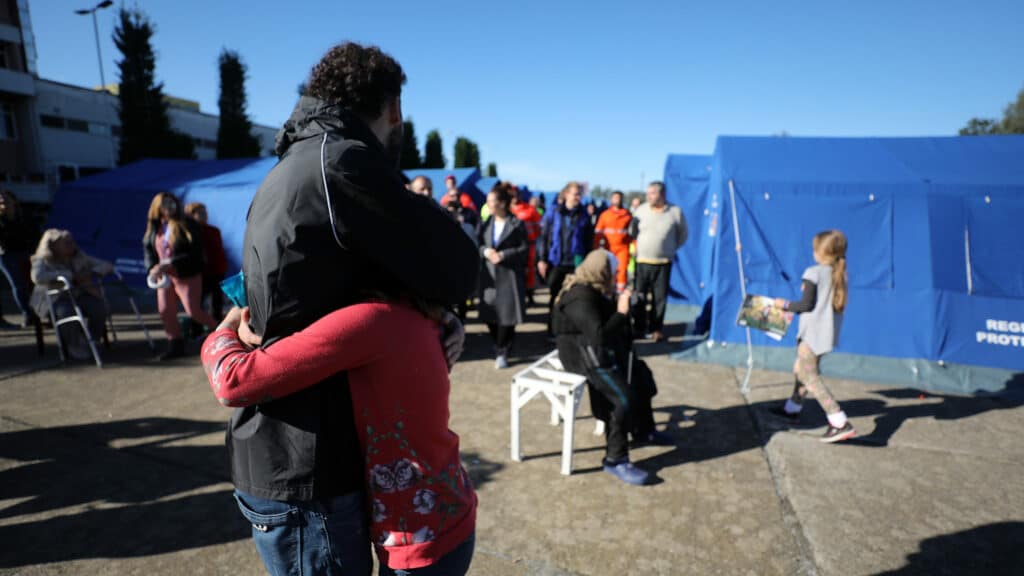Marc-Henry Soulet, professor of sociology at the University of Fribourg in Switzerland, spoke at the 2022 Foundation Meetings. By defining the social bond and the conditions in which it can be acted upon, he offers keys to understanding, questioning and improving the aid relationship and social work.
Can we define social ties?
Social ties are are a fiction. No one has ever seen it walking down the street. It is a fiction necessary to sociologists, a basic postulate: there is no society without links. Thus, sociology distinguishes itself from economic and philosophical liberalisms that base their ana-lyses on the individual: his reason, his beliefs or his interest. For the sociologist, before the individual, there are the relations. In other words: one is not born an individual, one becomes one.
This social link has very tangible, very real manifestations around us. First of all, there are personal ties, such as the attachment to one’s family or loved ones… We talk about strong ties. In addition, there are secondary ties that attach us to institutions through social roles. We must ensure, get up, work, smile to the neighbor, thank the baker, respect others and the law, be an eco-responsible citizen, a punctual colleague, a fair and skilful player, a good family man… We have an image to preserve in the eyes of others, and in our own eyes. These social roles are multiple; they carry meaning. Society recognizes us in our capacity to hold a number of roles, independently of who we are. In reality, these so-called weak links are much stronger than we think. They attach us, structure us, oblige us and make us stand up straight. In this, the social link is a fiction, but it is an active fiction.

Social ties are active. But how can we have an impact on social ties?
For all the members of a community, we can educate them to live together, to work on the tension between equality and differences, to transcend divergences, to agree on principles that we recognize as common…
For the most disadvantaged, the problem is different. We often speak of vulnerable people, as if they were at risk. In reality, they are already victims of a fundamental wound, a wound of the link. Deprived of a social link, the excluded person is no longer connected. And above all, he is no longer obliged, that is to say, he is no longer obliged to put on a good show, to play his social roles. Without ties or constraints, he is no longer a social being. He is a free individual, too free… Re-weaving the social link therefore comes down to finding the means to recreate, within a pro-protective framework, situations where people are committed, obliged, i.e. situations where they have an opportunity to become trustworthy again, and to be proud of it.
Under what conditions can the caregiving relationship allow the recreation of this broken social link ?
The fight against extreme exclusion is similar to a diplomatic task that could be repositioned on four pillars: reaching, meeting, mobilizing and pluralizing. Reaching out means, in concrete terms, “going towards”, working outside the walls, changing territory. For example: the ma-rauds. But changing places is not enough. You have to open up to the other, meet him in his strangeness, change your posture and take his rules and norms seriously… like with anyone else. Finally, it is a matter of trying to treat the other person as a fellow human being: something that is not always taken for granted in the helping relationship and which constitutes an act of humanization. Secondly, it is essential to mobilize, involve, engage, oblige. The idea is to ensure that the relationship lasts so that the person assumes a social role, so that there is reciprocity. Be careful, it is not a question of making a binding contract that gives and takes. The risk would be too great. On the contrary, it is a question of arousing the desire to be credible again, to respond to an expectation, to live up to it. The helping relationship must absolutely avoid being an infantilizing and humiliating gift. Finally, to pluralize is to give access to other social roles, other functions, other attachments, other obligations. No one can be satisfied with being reduced to playing a single role in perpetuity: that of the old, the refugee, the precarious…
Re-listen to the introductory words of Marc-Henry Soulet during the third edition of the Foundation annual meeting on humanitarian and social research “Rencontres de la Fondation” on 4 October 2022 (in French only)
Top photo credit: Christophe Hargoues for the French Red Cross





